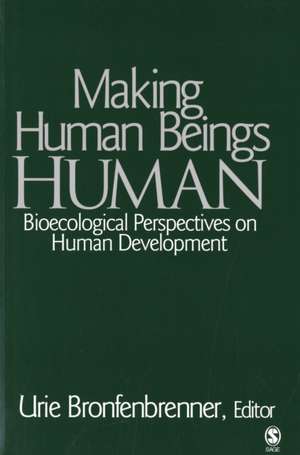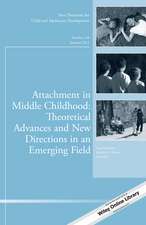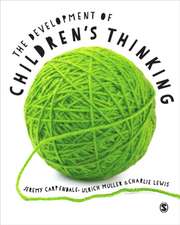Making Human Beings Human: Bioecological Perspectives on Human Development: The SAGE Program on Applied Developmental Science
Editat de Urie Bronfenbrenneren Limba Engleză Paperback – 16 aug 2004
The book is rich in cultural and historical comparisons. The concepts of the bioecological model and the ecology of human development represent a unique contribution to the field of developmental psychology.
Features contributions and commentary by distinguished scholars: a Foreword by Richard M. Lerner of Tufts University and an Afterword by Stephen F. Hamilton and Stephen J. Ceci of Cornell University.
| Toate formatele și edițiile | Preț | Express |
|---|---|---|
| Paperback (1) | 725.48 lei 3-5 săpt. | +18.76 lei 4-10 zile |
| SAGE Publications – 16 aug 2004 | 725.48 lei 3-5 săpt. | +18.76 lei 4-10 zile |
| Hardback (1) | 994.85 lei 6-8 săpt. | |
| SAGE Publications – 6 sep 2004 | 994.85 lei 6-8 săpt. |
Preț: 725.48 lei
Preț vechi: 980.37 lei
-26% Nou
138.86€ • 150.89$ • 116.72£
Carte disponibilă
Livrare economică 31 martie-14 aprilie
Livrare express 14-20 martie pentru 28.75 lei
Specificații
ISBN-10: 0761927123
Pagini: 336
Ilustrații: black & white illustrations
Dimensiuni: 152 x 229 x 18 mm
Greutate: 0.46 kg
Ediția:New.
Editura: SAGE Publications
Colecția Sage Publications, Inc
Seria The SAGE Program on Applied Developmental Science
Locul publicării:Thousand Oaks, United States
Recenzii
"This volume is a remarkable compilation of several critical writings of one of the most influential developmental psychologists of the 20th, and now 21st, century. Making Human Beings Human is an essential reader for all students of human development, whether they are undergraduates, graduate students, teachers, practitioners, or policy makers. . . . To read this book is to be a passenger on an exhilarating six-decade-long journey of discovery which, for those interested in the landscape of human development, is every bit as exciting as a Lewis and Clark expedition."
In his latest book, Dr. Bronfenbrenner’s bioecological theory of human development offers an important framework upon which to examine the effectiveness of our early childhood policies, programs, and practices on the lives of America’s children and families. In the unfolding of his theory, we find evidence that what, when, and how we do our work does make a critical difference in the developmental outcomes of young children and their families, especially those who are most vulnerable. As a result, we are honor bound to examine our own beliefs and practices in whatever field we find ourselves in the realm of human development work to ensure that our approaches respect and recognize the unlimited potential of all human beings and provide the resources and support that all families need to engage in healthy and productive lives.
Cuprins
Dedication
Foreword - Richard M. Lerner
Introduction
Section I: ON THE NATURE OF BIOECOLOGICAL THEORY AND RESEARCH
Section Introduction
Article 1. The Bioecological Theory of Human Development (2001)
Article 2. Social Ecology over Time and Space (1995)
Article 3. Social Status, Structure, and Development in the Classroom Group (1942)
Article 4. Social Ecology of Human Development (1973)
Article 5. Lewinian Space and Ecological Substance (1977)
Article 6. A Future Perspective (1979)
Article 7. Toward a Critical History of Development. A Propaedeutic Discussion (1986)
Article 8. Interacting Systems in Human Development. ResearchParadigms: Present and Future (1988)
Article 9. Developing Ecology (1989)
Article 10. Ecological Systems Theory (1992)
Article 11. Heredity, Environment and the Question "How." A First Approximation (1993)
Section II: USING THE ECOLOGY OF HUMAN DEVELOPMENT TO ENHANCE THE HUMAN CONDITION
Section Introduction
Article 12. Growing Chaos in the Lives of Children and Families. How Can We Turn it Around? (2001)
Article 13. The Split Level American Family (1967)
Article 14. Minority Report of Forum 15- 1970 White House Conference on Children (1970)
Article 15. Two Worlds of Childhood: U.S. and U.S.S.R. (1970)
Article 16. Is 80% of Intelligence Genetically Determined? (1975)
Article 17. The Future of Childhood (1985)
Article 18. Strengthening Family Systems (1988)
Article 19. Child Care in the Anglo-Saxon Mode (1992)
Afterword - Stephen F. Hamilton and Stephen J. Ceci
Notă biografică
Urie Bronfenbrenner is the Jacob Gould Schurman Professor Emeritus of Human Development and Psychology at Cornell University. He is best known as the founder and principal protagonist of his ground-breaking theory of the "Ecology of Human Development." Bronfenbrenner is one of the founders of Head Start and the recipient of numerous distinguished awards including six honorary degrees, three from European universities. He was the first recipient of the American Psychological Association′s annual Bronfenbrenner Award for Lifetime Contribution to Developmental Psychology in the Service of Science and Society. He has taught, lectured, consulted, and carried out research in the United States and all over the world, mainly in both Eastern and Western Europe, Japan, and Australia. His publications have been extensive and far-reaching . Urie Bronfenbrenner is a member of the American Academy of Arts and Sciences, American Psychological Society, American Psychological Association, Society for Research in Child Development, National Academy of Education, and the International Society for the Study of Behavioral Development. Bronfenbrenner received his Bachelor′s degree in Psychology and Music from Cornell University, his Master′s Degree from Harvard University, and his Doctorate from the University of Michigan. After service in the Armed Forces and a brief period at the University of Michigan, he returned to Cornell University for a long productive life of research and teaching, as well as assisting with the raising of his six children. Since his retirement in 1987, he has continued to research, to write, to teach, and to travel extensively.












